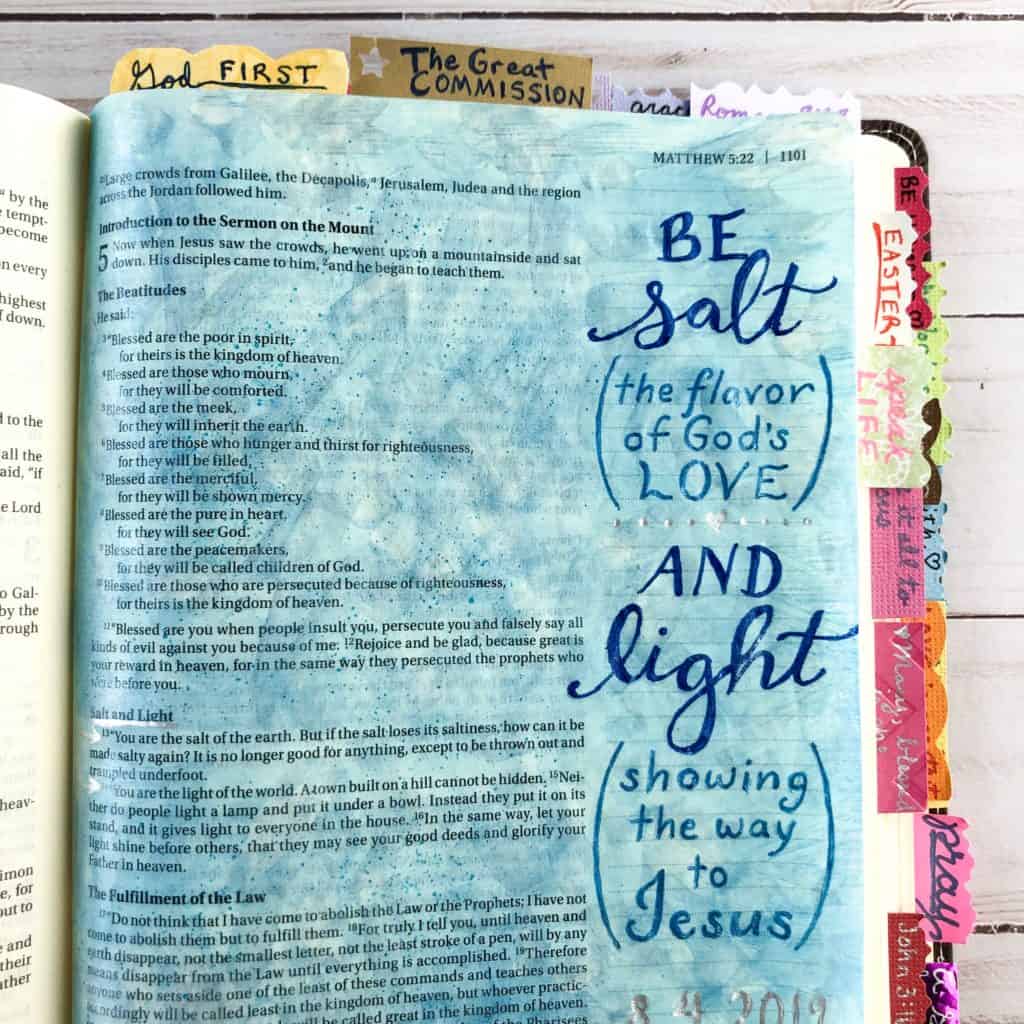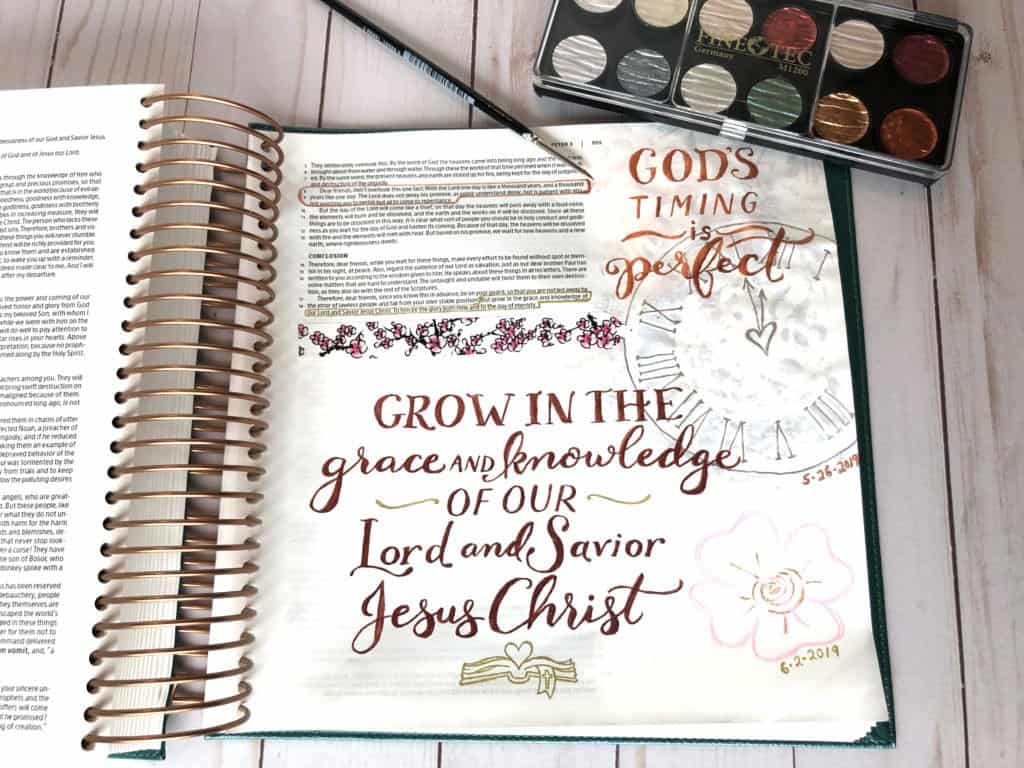Is there anything inherently wrong about writing or creating art in one’s Bible? And furthermore, is Bible journaling disrespectful? Here are four important things to consider, when engaging in Bible journaling.

{ This post and the photos within it contain affiliate links. If you make a purchase after clicking an affiliate link, my ministry gets a small commission, with no extra cost to you. See my full disclosures HERE. }
There was a time when it seemed unthinkable to me, that anyone would highlight or take notes in their Bible. Years ago, I remember seeing an older woman at church open her Bible—and to my shock, it was FULL of highlighted passages and scribbled notes.
Back then, I was just a casual church-goer. I saw the Bible more as a sacred religious text, than a love letter from God that I should interact with and learn from on a daily basis. But NOW, all these years later, I get it.
If you’re reading this now, you’ve probably either started “Bible journaling” yourself, or you’ve encountered others who do. Maybe your friend has a coloring Bible, and your Instagram feed is full of Bible journalers’ artwork. And you’re wondering, as I once did, is this OKAY at all?
Is Bible journaling disrespectful?
Or to take it a step further, is Bible journaling disrespectful to God and His Word? Is it really acceptable to write or create art on the pages of the Bible?
And I think the answer lies in the fact that, ANYTHING can be used disrespectfully (with the wrong motives/attitudes), if we’re not careful. Take prayer for example: The purpose of prayer is to have communion with God. But, it’s quite possible to turn it into ONLY a means to ask for what we want, while conveniently forgetting to repent of our sins, give thanks for the blessing God has given us, and listen for His direction.
The same can be said of Bible study and artistic Bible journaling. If we’re only focusing on creating art in our Bibles, but not really paying attention to what God is saying to us in His Word, then yes, I would say that’s disrespectful. But, if we’re using Bible journaling as a means to study God’s Word, to worship Him, and to listen and learn from Him, and apply His teachings to our lives, then Bible journaling becomes a means of growing in relationship with our Creator, and bringing Him glory and honor by living out His Word in our lives.

So, the question we should ask isn’t “is Bible journaling disrespectful?”, but “am I using Bible journaling as an excuse to make art on the pages of the Bible, or as a tool to study God’s Word and to grow in relationship with Him?”. There’s no reason why you shouldn’t write in your Bible, unless you feel that it’s leading you in the wrong direction, and not helping you to grow closer to God.
What does the Bible say about journaling?
However, with that being said, I don’t want to only render my own opinion on this. So, I’ve prayed about it, and rounded up a few Bible verses on journaling, which can give us a bit more clarity.
Granted, there aren’t any Bible verses about journaling that specifically tell us whether it’s acceptable to write or create art directly on the Bible pages. But these verses DO tell us a lot about the importance of studying the Scriptures using various different methods. Ultimately, you’ll need to weight the benefits of Bible journaling for yourself, to decide whether it should be a part of your personal Bible study practice.
1) God’s Word is Truth, and Useful for Spiritual Growth
First and foremost, the Bible tells us that God’s Word is infinitely valuable for teaching us right from wrong. The Bible is our manual for how God wants us to live: how to interact with Him, and how to treat others. So, it makes sense to study it in whatever ways work best for each of us.
All Scripture is God-breathed and is useful for teaching, rebuking, correcting and training in righteousness, so that the servant of God may be thoroughly equipped for every good work.
2 Timothy 3:16-17
For the word of God is alive and active. Sharper than any double-edged sword, it penetrates even to dividing soul and spirit, joints and marrow; it judges the thoughts and attitudes of the heart.
Hebrews 4:12
2) God’s Word Should Be “Meditated” On
And one such way we can learn from the Scriptures, is by “meditating” on them. The word “meditation” means to engage in thought or contemplation, or to reflect. So, if we’re to “meditate” on God’s Word, we should memorize it, write it, say it out loud, think on it, and ponder it.
Keep this Book of the Law always on your lips; meditate on it day and night, so that you may be careful to do everything written in it. Then you will be prosperous and successful.
Joshua 1:8

Let the word of Christ dwell in you richly, teaching and admonishing one another in all wisdom, singing psalms and hymns and spiritual songs, with thankfulness in your hearts to God.
Colossians 3:16
3) God’s Word Should Be Written EVERYWHERE
This passage speaks volumes, specifically in regards to writing out Scripture. In these Bible verses about writing, God says to put His Word everywhere, so we can see it, internalize it, and make it part of ourselves.
Fix these words of mine in your hearts and minds; tie them as symbols on your hands and bind them on your foreheads. Teach them to your children, talking about them when you sit at home and when you walk along the road, when you lie down and when you get up. Write them on the doorframes of your houses and on your gates”
Deuteronomy 11:18-20

This Scripture is a big reason why I create hand-lettered Bible verses that people can display in their homes…because I believe there is great value in not only studying the Bible, but also reinforcing that by displaying God’s Word, listening to songs that are inspired by Scripture, and being reminded of Biblical truth all day every day… especially when there’s so much worldly influence in our lives pulling us away from God. He knows we need all the reminders we can get!
And the same thing goes for writing in my Bible. I choose to engage in Bible journaling for spiritual growth, because it’s another way I can meditate on Scripture, write out key verses, reflect on what it means and how to apply it to my life, and then refer back to it later. It helps me to “bind them on my forehead”, as Deuteronomy 11:18 puts it.
4) We shouldn’t judge each other for the differing ways we study God’s Word or the ways we interact in relationship with Him.
But beyond what we may think about Bible journaling, or even a particular facet of it (like highlighting verses, as opposed to full-page Bible art journaling), we need to respect the unique ways we each connect with God and His Word. While one person may study the Bible purely by reading, someone else may find that journaling helps them better understand the Word. And yet another, may prefer to listen to Scriptures via audio book.
Accept the one whose faith is weak, without quarreling over disputable matters. One person’s faith allows them to eat anything, but another, whose faith is weak, eats only vegetables. The one who eats everything must not treat with contempt the one who does not, and the one who does not eat everything must not judge the one who does, for God has accepted them. Who are you to judge someone else’s servant? To their own master, servants stand or fall. And they will stand, for the Lord is able to make them stand.
One person considers one day more sacred than another; another considers every day alike. Each of them should be fully convinced in their own mind. Whoever regards one day as special does so to the Lord. Whoever eats meat does so to the Lord, for they give thanks to God; and whoever abstains does so to the Lord and gives thanks to God.
Romans 14:1-6
I hope this post has helped you to answer the question, “Is Bible journaling disrespectful?” for yourself. Ultimately, we each have unique ways of learning and connecting with the Lord, and for some, Bible journaling can be an excellent tool for studying God’s Word.
Have you tried Bible journaling yet? If not, I encourage you to give it a chance. When I first starting Bible art journaling, I was simply curious and eager to create art in my Bible. Little did I know, how it would cause me to fall in love with God’s Word, and how much it would help me to study the Bible on a deeper and more meaningful level. You never know until you try.

Hi! Thank you so much for visiting Divine Creative Love. I’m a Jesus-lovin’ girl, lettering artist, designer, and general creative-at-heart. And, I have narcolepsy. I blog about faith in God, overcoming challenges, and creative topics such as Bible journaling. If you’re new here, be sure and subscribe to my list so you won’t miss anything!

Based on Revelation 22:18, I do not journal “in” my Bible, but would write thoughts and sermon notes on a separate paper or in a notebook and not keep it in my Bible. I do, however, underline verses, as that is not “adding any words”. The Bible is not called “Holy” for nothing. It is different from every other book in the world and should be treated as such.
I definitely agree, we should never add (or subtract) anything from God’s Word. Bible journaling is simply a way to study, understand, and apply the Scriptures to our lives. It’s a great tool, whether it’s done on the same page alongside Scriptures, or in a notebook.